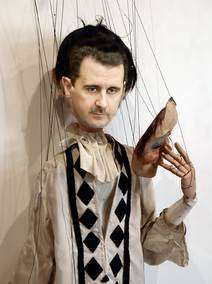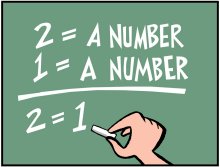After yet another assassination, Lebanon's anti-Syrian politicians accuse the government in Damascus of trying to end their rule by killing members of the parliamentary majority one by one. This week's slaying of anti-Syrian lawmaker Walid Eido in a massive Beirut car bombing has sparked a new political battle here, fueling rifts that are putting Lebanon's democracy at the risk of a total breakdown.
With Eido's death, Prime Minister Fouad Siniora's majority in parliament has been whittled down to only four seats. If he loses those either by deaths or defections his government could fall, a goal of the pro-Syrian opposition led by the Hezbollah militant group.
Samir Geagea, a leading Christian member of the anti-Syrian coalition, accused Syria on Friday of killing Eido a claim echoed by many of the government's supporters and denied by Damascus. "Eido was assassinated to reduce the parliamentary majority in order to bring the government down," Geagea said at a news conference. Geagea led the main Christian militia during Lebanon's 1975-1990 civil war and was imprisoned for 11 years on charges of killing a prime minister, an accusation he said was cooked up by the Syrians.
Similarly the Lebanese parliament majority leader , Saad Al-Hariri, has accused Syria of murdering Lebanese MP Walid Eido. Al-Hariri called on the Arab League to bear the responsibility for the "regime of terror that violates Lebanon's sovereignty, harms its security, and murders its intellectuals and politicians," and stated that the league had to defend Lebanon or boycott this regime of terror.
Similarly , Lebanese Druze Leader Walid Jumblatt accused Syria of the murder: " it was Syria and its lackeys in Lebanon who murdered Lebanese MP Walid Eido" he said. He added that as long as Syrian President Bashar Al-Assad remained in power, there would be no stability in Lebanon, and that the Arab countries must realize that Assad was a danger to them. Jumblatt also attacked Hezbollah Secretary-General Hassan Nasrallah, and postulated that the instructions he was receiving from the Syrian and Iranian intelligence apparatuses were stronger than his political will.
On Saturday, Siniora's Cabinet called for a by-election to be held Aug. 5 for Eido's seat and that of Industry Minister and lawmaker Pierre Gemayel, who was assassinated in November, Information Minister Ghazi Aridi said. Lahoud's signature will be needed to ask parliament to approve the by-election, but he refused to provide it after Gemayel's slaying in November.
At Eido's funeral Thursday, legislator Mohammed Kabbani, speaking for the Future Movement, the main bloc of the parliament majority, supported an election to avert the "plan to reduce the parliamentary majority through murder."
If Lahoud refuses to sign an election decree, it "would make him a participant in that plot ( of assassinations) and consequently a participant in the murders," Kabbani warned. "Elections must take place even if Emile Lahoud rejects it."
Even if Lahoud approved such an election, the 128-seat parliament would then need to pass it, and pro-Syrian parliament speaker Nabih Berri has refused to allow the legislature to convene for months. Lahoud, Berri and the opposition do not recognize Siniora's government, saying it is unconstitutional since all five Shiite members and a Christian ally ( Lahoud's representative in the cabinet) quit in November. The constitution requires that all major sects be represented in the Cabinet. There are already calls from the majority to go ahead with the by-election anyway irrespective of what the president and parliament speaker do.
Another political crisis is also looming over the presidency. The legislature must vote on a replacement when Lahoud's term ends in November, but it is unlikely that Lebanon's divided leaders can agree on a candidate or even meet threatening a power vacuum, or even the creation of two rival governments.
Some majority lawmakers are already calling for Lahoud's impeachment if he impedes the by-elections, but that, too, requires a legislative session. All sides including Syria's ally, the Shiite Hezbollah have condemned Eido's killing in a blast Wednesday that also killed his son and eight other people. He was the seventh anti-Syrian figure slain in the past two years, including two other lawmakers. The assassinations began with the massive suicide truck bombing in Beirut that killed former Prime Minister Rafik Hariri and 22 others. Eido's slaying came just three days after an international tribunal ordered by the U.N. Security Council went into effect.
Government supporters blame Syria in all the assassinations. Syria, which opposes the international tribunal, denies any role. Hezbollah and its allies say the killings have been carried out by unknown parties aiming to enflame Lebanon's political crisis. So far, Lebanon's leaders have kept a cap on reprisal violence. But the political feuds that lie ahead could push either side to the breaking point. Government and opposition supporters battled in the streets for several days earlier this year in violence that killed 11 people and took on a dangerous sectarian tone in a country sharply divided between Christians, Sunni Muslims and Shiite Muslims. |
 [Ma'an] A hand grenade reportedly exploded at the office of Fatah official Sultan Abu Al-Aynayn in the city of Tyre, Lebanon on Monday.
[Ma'an] A hand grenade reportedly exploded at the office of Fatah official Sultan Abu Al-Aynayn in the city of Tyre, Lebanon on Monday. 
 Lebanese President Emile Lahoud ordered the army to take charge of security on Friday after political rivalry blocked the election of his successor, hours before he was due to step down. The Lebanese parliament failed on Friday to grasp its last chance to elect a head of state before pro-Syrian Lahouds term expires at midnight. The speaker of parliament asked members to meet again next Friday for another attempt.
Lebanese President Emile Lahoud ordered the army to take charge of security on Friday after political rivalry blocked the election of his successor, hours before he was due to step down. The Lebanese parliament failed on Friday to grasp its last chance to elect a head of state before pro-Syrian Lahouds term expires at midnight. The speaker of parliament asked members to meet again next Friday for another attempt.  The accusations directed by Hezbollah Secretary General, Hassan Nassrallah at Israel regarding its responsibility for the series of assassinations in Lebanon reminds of the myth that emerged after the September 11 attacks.
The accusations directed by Hezbollah Secretary General, Hassan Nassrallah at Israel regarding its responsibility for the series of assassinations in Lebanon reminds of the myth that emerged after the September 11 attacks. Lebanese Druze leader Walid Jumblatt said yesterday a political standoff between his ruling coalition and an opposition that includes Hezbollah might result in the creation of two rival governments if not resolved.
Lebanese Druze leader Walid Jumblatt said yesterday a political standoff between his ruling coalition and an opposition that includes Hezbollah might result in the creation of two rival governments if not resolved.